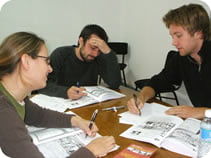There are different letters in Spanish with a similar pronunciation, and it makes difficult to decide whether we should write a word with “V” or “B”, for example. The problem is that sometimes the misspelling can also imply a new word with a different meaning.
Today, I want to give you some hints to distinguish between some of these knotty words: haya and halla. Both of them are verbal forms, but the first one is much more frequently used than the second.
1. Haya, with y, is a form of verb haber:
El fabricante niega que haya desperfectos.
(The manufacturer denies that there are damages.)
Trick: if we can replace haya for pueda haber we can be sure that the correct form is with y.
El fabricante niega que pueda haber desperfectos.
2. Hayais also the name of a tree (beech).
Hay un bosque de hayas cerca de casa.
(There is a beech wood close to home.)
3. Hallawith ll is a form of verb hallar. It is a synonym of encontrar (to find), so a good way to know if we have to write ll instead of y in the verb is to change it for encontrar and check the sentence´s meaning.
Halla muerto a su vecino en el ascensor.
(He finds his neighbor dead in the lift.)
Encuentra muerto a su vecino en el ascensor.
To be sure this verb is not with y, let´s apply the trick:
Pueda haber muerto a su vecino. (Nonsense)
We will find some exceptions to the rule obviously, but I hope this short explanation helps you with your doubts. And now, let´s practice with some exercises!
a) Ninguno de los entrevistados cree que la situación ________ empeorado.
b) Los muebles de mi dormitorio son de __________.
c)___________ la solución a este problema.
d) ¿Dónde se __________ la sección infantil?
e) Ojalá no _____________ más problemas.



